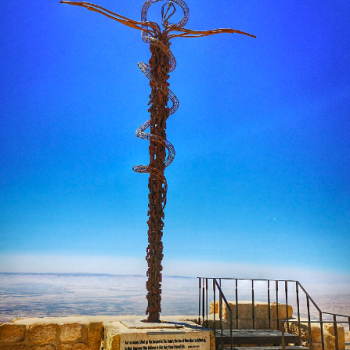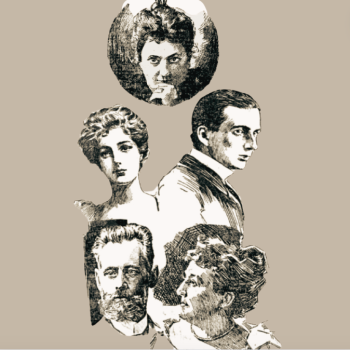
Jeremiah first pours out his heart in lament: “My hope is lost!” (Lam 3:1–18). But now, he begins to remember again as he finds new morning mercies in the faithfulness of God. He pleads in pain: “Remember my affliction and my wanderings, the wormwood and the gall!” (v. 19; see vv. 5, 15). His afflictions have left him without a home and his soul is crushed by sadness. He knows, of course, that the Lord sees everything. We don’t need to jog his memory. Yet still, the prophet cries for God to see the sorrows which bring him daily to his knees: “My soul continually remembers it and is bowed down within me” (v. 20).
In desperation, Jeremiah turns his heart to the truths of God: “But this I call to mind, and therefore I have hope” (v. 21). Such hope comes as we daily preach the gospel to ourselves and actively rest on the promises of God’s grace. Hope comes when God’s Word captures our foolish thoughts and we choose to trust his goodness. Hope comes when we fight to orient our hearts toward God and remember our precious Savior. Hope comes when we call to mind the truth that “the steadfast love of the LORD never ceases; his mercies never come to an end; they are new every morning; great is your faithfulness” (vv. 22–23; see Deuteronomy 30:1–11). Here, at the pinnacle of the entire book, Jeremiah recalls the God who revealed his glory to Moses (Exodus 34:6–7a). So, consider each phrase in turn:
“The steadfast love of the LORD never ceases” (Lamentations 3:22a)
The steadfast love of the LORD speaks of Yahweh’s covenant love (hesed)—the love that never fails and never ceases to act on our behalf. God continues to love us even when we mess up, like Israel, and chase after idols which land us in exile. Lament dares to hope in God, for because of his steadfast love we are not consumed.
“His mercies never come to an end” (v. 22b)
The Lord pours out kindnesses upon us even though we are undeserving. He covers us with his compassion. These “mercies” (racham) occur in the plural to indicate great abundance, for God grants mercies whenever we are hurting, angry, or afraid. He grants mercies whenever we need comfort from our suffering or forgiveness of our sin (Micah 7:18–20). He grants us his mercies at all times.
“They are new every morning” (v. 23a)
Instead of stocking an unlimited storehouse, God provides new mercies every day. This “newness” speaks not of mercies that never-before existed, but rather a fresh renewal of what we daily receive (Psalm 36:5–7). God’s new morning mercies are like manna in the morning (Exodus 16:35; Nehemiah 9:20–21). They provide just enough each day.
“Great is your faithfulness” (v. 23b)
God’s faithfulness (emunah) embodies his steadfastness, firmness, and fidelity to the truth. It comes from the same root as “Amen,” for we affirm his truths. The Lord doesn’t change. He doesn’t falter. He never gives up on wayward children. Our hearts may declare that “life is hopeless!” Yet we must argue back against such lies.
Jeremiah thus concludes, “‘The LORD is my portion,’ says my soul, ‘therefore I will hope in him’” (v. 24). His soul was bowed low (v. 20), but he has discovered new hope as he claims his portion in the Lord: “My God is enough for me. He’s all I need—my daily bread.” God’s new morning mercies remind us of two essential truths. First of all, today’s mercies are for today’s burdens. My daughter sometimes bakes together with my wide. She wears a little chef’s hat and apron as she stands on a stool just to see over the counter. As she mixes the ingredients, my wife reminds her that certain recipes call for certain measurements and that the recipe-maker has already determined the proper amount for each ingredient. So also, our lives reflect the words of the old hymn:
He, whose heart is kind beyond all measure,
Gives unto each day what he deems best—
Lovingly, its part of pain and pleasure,
Mingling toil with peace and rest.
Our God gives us just enough mercies to handle today—just enough pain to not overwhelm—just enough pleasure to fix our gaze on him. And even lament can be a gift. Tears remind us that we are still alive and recipients of God’s grace. Every morning we awake is a gift of God (Psalm 3:5). So, we might not always like our trials, but God gives everything in his good measure. He is the recipe-Maker whose mercies today are only for today.
The second truth is that tomorrow’s mercies must wait for tomorrow. Again, the hymn beckons:
Every day the Lord himself is near me,
With a special mercy for each hour.
Our God does not give us mercies in advance, but sufficient mercies for each day. So, we trust him today that he will give us what we need tomorrow, new and afresh, full and sufficient. In 1931, a missionary named John Vinson was working in Northern China when an army of bandits swooped down on his village looting, burning, and killing. They took 150 Chinese prisoners and also Vinson captive. Yet as the government troops pursued them, the bandits offered to free him if he would write a letter to the commanding officer requesting him to withdraw.
Vinson asked, “Will you let the Chinese prisoners go free as well?”
“Certainly not,” they answered.
“Then, I refuse,” he replied.
So, that night the bandits fled, taking Vinson with them. Many of the other captives escaped, but Vinson could not run away because of a recent surgery. One of the bandits then pointed a gun at his head and told him, “I'm going to kill you. Aren't you afraid?” To which the missionary replied, “No, I am not afraid. For if you kill me, I will go straight to God.” Which he soon did.
Application Insight: Are you prepared to meet the Lord? Is he your portion in this life and the next? You might never face a choice like John Vinson, but you must choose each day where to place your trust. You must call to mind your hope in God. So, are you drawing on today’s mercies for this day’s troubles? Are you trusting in tomorrow’s mercies for tomorrow’s troubles (Deut 33:25)? Do not be anxious about tomorrow, for both your troubles and God’s mercies are measured out each day.
5/16/2024 4:32:49 PM




